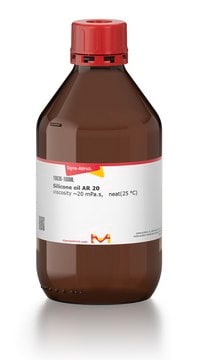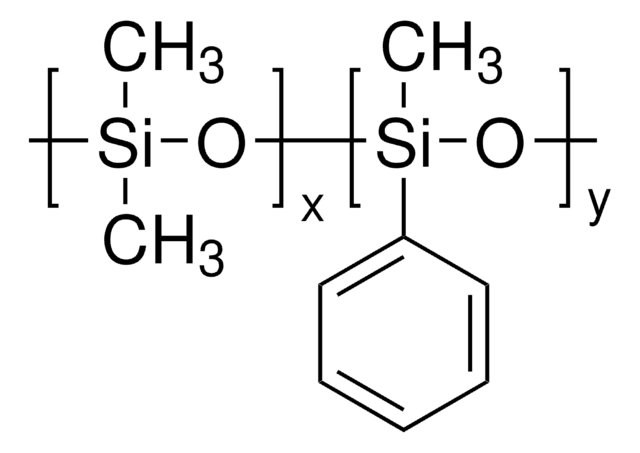378399
Silicone oil
viscosity 1,000 cSt (25 °C)
Synonym(s):
Dimethylpolysiloxane, Dimethylsilcone fluid, Poly(dimethylsiloxane)
Sign Into View Organizational & Contract Pricing
All Photos(1)
About This Item
Linear Formula:
[-Si(CH3)2O-]n
CAS Number:
MDL number:
UNSPSC Code:
12162002
NACRES:
NA.23
Recommended Products
vapor density
>1 (vs air)
Quality Level
vapor pressure
<5 mmHg ( 25 °C)
5 mmHg ( 20 °C)
form
viscous liquid
refractive index
n20/D 1.403 (lit.)
viscosity
1,000 cSt(25 °C)
bp
>140 °C/0.002 mmHg (lit.)
density
0.97 g/mL at 25 °C
Looking for similar products? Visit Product Comparison Guide
General description
Silicone oil is a liquid based siloxane that is part of the methyl silicone fluid system. It has a viscosity of 1000 cSt with a refractive index of ~ 1.403 and a dielectric strength of ~ 14 kV/mm. It′s surface tension tends to increase with an increase in the viscosity.
Application
Silicone oil can be used for a wide range of applications such as: heat transferring medium in chemical and petrochemical industries, a dielectric coolant, protective coatings for building materials, a cosmetic additive.
Storage Class Code
10 - Combustible liquids
WGK
WGK 1
Flash Point(F)
214.0 °F - closed cup
Flash Point(C)
101.1 °C - closed cup
Personal Protective Equipment
dust mask type N95 (US), Eyeshields, Gloves
Choose from one of the most recent versions:
Already Own This Product?
Find documentation for the products that you have recently purchased in the Document Library.
Customers Also Viewed
Silicones
Moretto H, et al.
Ullmann's Encyclopedia of Industrial Chemistry (2000)
Recent developments and applications of protective silicone coatings: A review of PDMS functional materials
Eduok U, et al.
Progress in Organic Coatings, 111, 124-163 (2017)
Mechanism of Stabilization of Silicone Oil- Water Emulsions Using Hybrid Siloxane Polymers
Mehta SC and Somasundaran P
Langmuir, 24(9), 4558-4563 (2008)
Amir Sanati Nezhad et al.
Proceedings of the National Academy of Sciences of the United States of America, 110(20), 8093-8098 (2013-05-01)
Tip-growing cells have the unique property of invading living tissues and abiotic growth matrices. To do so, they exert significant penetrative forces. In plant and fungal cells, these forces are generated by the hydrostatic turgor pressure. Using the TipChip, a
Nobuo Yoshimoto et al.
Scientific reports, 3, 1191-1191 (2013-02-05)
When establishing the most appropriate cells from the huge numbers of a cell library for practical use of cells in regenerative medicine and production of various biopharmaceuticals, cell heterogeneity often found in an isogenic cell population limits the refinement of
Our team of scientists has experience in all areas of research including Life Science, Material Science, Chemical Synthesis, Chromatography, Analytical and many others.
Contact Technical Service



